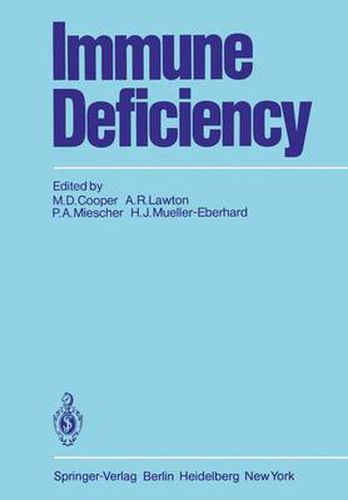Readings Newsletter
Become a Readings Member to make your shopping experience even easier.
Sign in or sign up for free!
You’re not far away from qualifying for FREE standard shipping within Australia
You’ve qualified for FREE standard shipping within Australia
The cart is loading…






This title is printed to order. This book may have been self-published. If so, we cannot guarantee the quality of the content. In the main most books will have gone through the editing process however some may not. We therefore suggest that you be aware of this before ordering this book. If in doubt check either the author or publisher’s details as we are unable to accept any returns unless they are faulty. Please contact us if you have any questions.
The subject of immune deficiency has become of special importance for two reasons. First, conditions with well defined defects in the immune system could be analyzed as experiments of nature in terms of finding out the accurate biological relevance of the defective link in the immune system. Secondly, the recognition of immune deficiency states has become important in order to provide the patients with the treatment necessary to remedy these defects. With regard to immune deficiency states in patients, these have been instrumental as experiments of nature in the revelation by Drs. Good and Cooper and their associates of the two-component structure of the immune system, a discovery which can be consi dered as a major breakthrough in the history of immunopathology. Today’s research allows us to go far beyond this basic two component structure with the assessment of disorders affecting either cell to cell interactions or regarding subsets of lymphocyte populations. Furthermore, the association of immune deficiency with distinct enzymatic defects of purine metabolism is opening the door to the molecular level of immune deficiency. Dr. Cooper and Dr. Lawton have succeeded in obtaining the collaboration of the leaders in the field of immune deficiency. In view of the importance of their contributions in scientific and clinical terms, we decided to prepare a book version of the two issues of Seminars in Immunopathology devoted to this subject.
$9.00 standard shipping within Australia
FREE standard shipping within Australia for orders over $100.00
Express & International shipping calculated at checkout
This title is printed to order. This book may have been self-published. If so, we cannot guarantee the quality of the content. In the main most books will have gone through the editing process however some may not. We therefore suggest that you be aware of this before ordering this book. If in doubt check either the author or publisher’s details as we are unable to accept any returns unless they are faulty. Please contact us if you have any questions.
The subject of immune deficiency has become of special importance for two reasons. First, conditions with well defined defects in the immune system could be analyzed as experiments of nature in terms of finding out the accurate biological relevance of the defective link in the immune system. Secondly, the recognition of immune deficiency states has become important in order to provide the patients with the treatment necessary to remedy these defects. With regard to immune deficiency states in patients, these have been instrumental as experiments of nature in the revelation by Drs. Good and Cooper and their associates of the two-component structure of the immune system, a discovery which can be consi dered as a major breakthrough in the history of immunopathology. Today’s research allows us to go far beyond this basic two component structure with the assessment of disorders affecting either cell to cell interactions or regarding subsets of lymphocyte populations. Furthermore, the association of immune deficiency with distinct enzymatic defects of purine metabolism is opening the door to the molecular level of immune deficiency. Dr. Cooper and Dr. Lawton have succeeded in obtaining the collaboration of the leaders in the field of immune deficiency. In view of the importance of their contributions in scientific and clinical terms, we decided to prepare a book version of the two issues of Seminars in Immunopathology devoted to this subject.